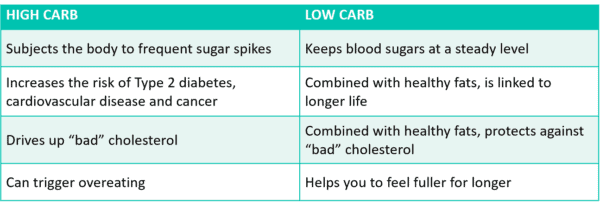A low-carb diet: Why it works
By Dr Michael Mosley
In recent years, I have noticed that everyone seems to be obsessed by the low-carb Keto Diet. For those not familiar, this diet, favoured by celebrities such as Kim Kardashian and Megan Fox, is a high-fat, very low-carb regime.
The idea is that eating minimal amounts of carbs will force your body to burn fat instead by turning fatty acids in your blood into ketone bodies. The body (and brain) then uses these as fuel instead of glucose from carbohydrates. While in the past I have been skeptical about a Keto Diet, I decided to do a little research myself and have now been able to take the principles of the very low carb keto diet and include healthy sources of fat, complex carbohydrates and protein, in essence, combining keto principles with the Mediterranean-style diet. The Fast 800 Keto is an accelerated method to help people lose weight, reduce blood sugars and improve overall energy and mood. As a result, I have written a new book, The Fast 800 Keto and the team at The Fast 800 have created Keto meal plans for the Online Programme as an option for those looking to lose weight or boost their metabolic health quickly.
So, what is Keto?
A diet that causes the body to release ketones into the bloodstream (ketosis). Generally, this is through carbohydrate restriction, a higher fat consumption and moderate protein intake.
The Fast 800 Keto is slightly different. Combining the Mediterranean diet principles, with calorie and carbohydrate restriction, The Fast 800 Keto is a short-term approach to kickstart ketosis and push your body into fat burning mode quickly.
Keto is a popular version of the age-old low-carb, high-fat approach, which was first written about by undertaker William Banting more than 150 years ago.
Banting, who was 5ft 5in and 14st, wrote a booklet entitled Letter On Corpulence, which detailed his attempts to tackle his obesity by eating a low-carb diet (though he didn’t call it that). He gave up sugar, potatoes, beer and bread and instead stuck largely to meat, greens, fruits and dry wine. He lost 3st in a year, and his book became a bestseller.
And so the low-carb diet was born, popping up in a host of variations throughout history (the Atkins Diet, for example). They are not greeted with much enthusiasm by doctors or dieticians as you have to eat a lot of fat. Clinical trials, however, consistently show that low-carb diets are effective for weight loss, over and above low-fat diets that once proved popular for those slimming down and watching their weight.

Are all carbs bad?
Not all carbs are created equal; just as there are good fats and bad fats, there are good carbs and bad carbs. The trick is not to cut carbs completely, but rather to be choosy about the ones you regularly eat. If you want to try going lower-carb then white bread, white pasta, potatoes and sugars, including maple syrup and agave nectar, are best eaten sparingly, if at all. They are easily digestible carbohydrates, meaning they are rapidly absorbed by the body, creating a big spike in your blood-sugar levels.
Instead, eat carbohydrates that contain lots of fibre. Fibre reduces the blood sugar spike, provides protection against bowel cancer and feeds the ‘good’ bacteria that live in your guts. Examples include vegetables, legumes – chickpeas and lentils – and wholegrains such as barley, oats, buckwheat, and wholegrain and rye. Although carbs are limited if you’re following a keto approach, the aim of The Fast 800 is for you to move through approaches, adding more calories and complex carbohydrates as you begin to find a way of eating that can be followed for life. The Fast 800 Keto or The Very Fast 800 (two of our low calorie approaches) are designed to be followed for a period of no longer than 12 weeks, or until you reach a healthy weight, whichever comes first.
Dr David Unwin, a GP in Southport, (who tweets as @lowcarbGP) has developed and tested a sensible approach to a low-carb diet.
David, winner of the NHS Innovator of the Year award, recommends his overweight patients try to cut out sugar and cut down on white (easily digestible) carbs such as bread, pasta and rice. He recommends eating plenty of blueberries, strawberries and raspberries, which are relatively low in fruit sugar, and green vegetables, protein, butter, full-fat yogurt and olive oil to retain fullness.
In a recently published study, patients following his advice lost almost 1½st on average, and 6in around the waist. There were big improvements in blood pressure and cholesterol levels too, and many of those with type 2 diabetes were able to come off medication. His GP practice is now saving more than £38,000 a year on its diabetes drug budget alone. Not bad for a ‘fad’ diet…
Carbs: how low should you go?
Medical evidence suggests that over the long-term, following a Keto Diet may not be achievable as it is a little more restrictive. However, it can be a useful tool for a kickstart to your weight loss before moving on to a more long-term, sustainable approach. If you are thinking about a Keto Diet, opt for fresh, healthy food, rather than processed options with a “keto” label and a high price tag! If you’re looking for additional support, make sure to try the Online Programme where we now offer a 7 day free trial. If you find that The Fast 800 Keto isn’t quite right for you, do try one of our other, more flexible and sustainable approaches, which still promote weight loss and improved metabolic health.
The traditional Mediterranean-style diet, based on unprocessed carbs, healthy fats, fresh vegetables and fruit, has been granting long life and good health for many centuries, and – studies show – is still doing so today.
The Mediterranean-style diet is built around unprocessed, whole foods. Legumes, brown rice, barley, oats, buckwheat and rye break down slowly in the body, releasing energy steadily through the day.
Low-carb, not low-fat: five practical steps
- Avoid processed carbohydrates and always check the label for added sugar. This includes fructose, glucose, maltose and other ingredients ending in “–ose”. Also, avoid syrups and juices, either as ingredients or as beverages.
- Instead, go low and go slow: a relatively low-carb diet will give you a slow release of glucose. Choose legumes, brown rice, oats, rye, barley and other wholegrains too.
- Cook, cool and reheat carbs like pasta, potatoes and rice. Dr Denise Robertson, of the University of Surrey, found that cooling and reheating pasta changes the structure of starch in the pasta, making it more resistant to digestive enzymes and leaving you with smaller, more manageable, blood sugar spikes.
- To succeed on a low-carb diet, increase your intake of healthy fats. Focus, in particular, on foods rich in olive oil and omega-3 oils. Olive oil is a very powerful ingredient; responsible for the bitter taste in olive oil, oleuropein has been shown to have cholesterol-lowering and anticancer effects. Further evidence also suggests that oleuropein may be able to help protect against Parkinson’s disease and Alzheimer’s.
- Increase your fibre intake: a Mediterranean-style low carbohydrate regime is naturally high in fibre. This helps you to feel fuller for longer.









